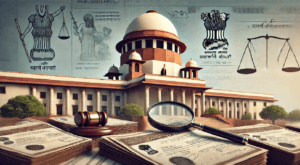Supreme Court Orders Probe Into Alleged Caste Certificate Scam in Tamil Nadu
The Supreme Court has ordered an investigation into a possible caste certificate scam in Tamil Nadu, suspecting large-scale fraud in issuing certificates for the Hindu Konda Reddis community. Justices J B Pardiwala and R Mahadevan noted that thousands of such certificates have been issued, raising concerns. The case began when the Madras High Court directed the issuance of a caste certificate to a petitioner’s son but also ordered verification of related family documents. The Tamil Nadu government challenged this ruling, leading to a temporary Supreme Court stay in 2019. Now, the court has modified its order, instructing the State Level Scrutiny Committee to complete an inquiry within six weeks before reviewing individual petitions.

Supreme Court Orders Probe Into Alleged Caste Certificate Scam in Tamil Nadu
The Supreme Court has raised serious concerns about a potential large-scale fraud involving caste certificates in Tamil Nadu. It has ordered a thorough investigation to determine whether certificates issued to individuals claiming to belong to the Hindu Konda Reddis community, a Scheduled Tribe group, are genuine.
On February 25, 2025, a bench comprising Justices J.B. Pardiwala and R. Mahadevan issued an interim order, pointing out that thousands of such certificates have been granted, raising suspicions of a major scam. While the court has not made any direct accusations, it emphasized that the situation appears highly suspicious and requires urgent scrutiny.
The case originates from a 2019 Madras High Court ruling, where the court directed the Revenue Divisional Officer in Salem district to issue a caste certificate to the son of a woman named A. Pradeepa. She had initially applied for the certificate but was denied after an inquiry. Dissatisfied with this decision, she approached the High Court, which ruled in her favor. However, the court also ordered that the caste certificates of her entire family be reviewed by the State Level Scrutiny Committee for verification.
The Tamil Nadu government opposed the High Court’s decision and appealed to the Supreme Court. In November 2019, the Supreme Court temporarily halted the High Court’s order. However, in its latest ruling, the court modified the stay, directing the State Level Scrutiny Committee to conduct a comprehensive investigation. The committee has been given six weeks to complete its inquiry and submit a report.
The Supreme Court emphasized that once the investigation report is received, it will review each case individually before making a final decision. This methodical approach ensures a thorough examination of the caste certificates’ authenticity and helps address any potential fraud.
The issue of caste certificates is crucial in India, as they grant access to education, employment, and other benefits reserved for Scheduled Tribes and marginalized communities. Fraudulent issuance of these certificates not only undermines the system but also deprives rightful beneficiaries of their entitlements.
By ordering a detailed investigation, the Supreme Court aims to uphold fairness and transparency in the certification process. Scrutinizing the legitimacy of these documents will help prevent misuse and protect the rights of those who genuinely qualify for Scheduled Tribe status.
This case highlights the importance of stringent verification measures in issuing caste certificates. It also underscores the need for vigilance to prevent large-scale fraud, which can have significant consequences for individuals and the system as a whole. The Supreme Court’s intervention is a crucial step toward ensuring justice and maintaining the integrity of the reservation system.
In summary, the Supreme Court has expressed concerns over possible fraudulent issuance of caste certificates in Tamil Nadu, particularly for the Hindu Konda Reddis community. It has ordered a thorough investigation to verify their authenticity and will review the findings before making a final decision. This move aims to uphold fairness, prevent system misuse, and protect the rights of legitimate beneficiaries.
You must be logged in to post a comment.